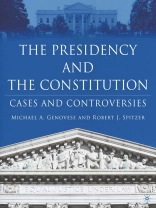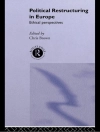This comprehensive case law book examines the evolution of judicial interpretation of the scope and limitations of presidential power. From interbranch struggles for power, to presidential selection, to campaign financing, to war powers, hardly an issue arises for the modern presidency that does not eventually find itself framed as a legal problem to be addressed by the courts. Each section provides an introduction providing background and framework for students. Throughout, the analysis is informed by the view that court decisions are framed by legal arguments and constitute legal issuances and are also framed by politics, and have profound political consequences. Coinciding with a broader intellectual and disciplinary return to institutions and law as key to understanding the presidency and modern politics, this book will find special favour among scholars who teach courses on the presidency and related areas.
Tabela de Conteúdo
Introduction: The Creation of the Presidency in the Constitutional System Presidential-Court Clashes: The Cases of Abraham Lincoln, Franklin Roosevelt, and Bill Clinton Congress Separation of Powers The War Power and Commander-in-Chief Executive Privilege Domestic Policy Administrative Powers Selection/Election Budgeting/Economy Foreign Policy Powers Conclusion: The Political Law of the Presidency
Sobre o autor
MICHAEL A. GENOVESE holds the Loyola Chair of Leadership and is Professor of Political Science at Loyola Marymount University, USA.
ROBERT J. SPITZER is Distinguished Service Professor of Political Science at the State University of New York, USA.












